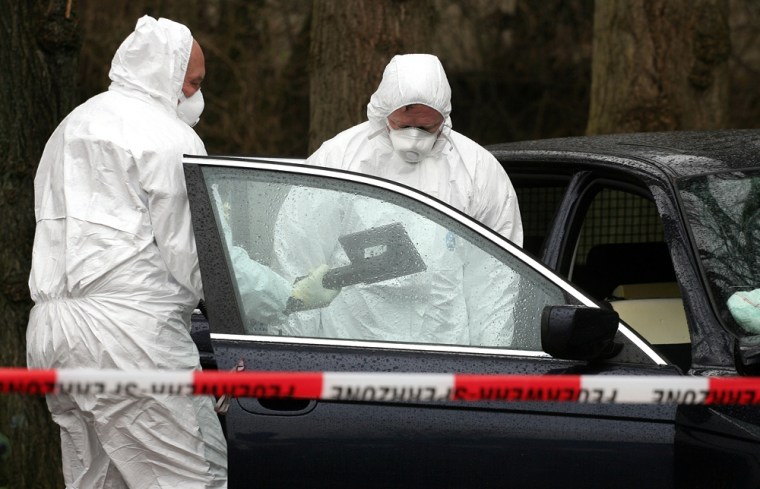German investigators have confirmed that a car used by a contact of a fatally poisoned ex-KGB agent before the two men met was contaminated with the rare radioactive substance polonium-210, police said Monday.
Still unknown is whether the Russian businessman Dmitry Kovtun was involved in the poisoning of Alexander Litvinenko, or a victim of it. He is reportedly being treated in Moscow for radiation poisoning, and his former wife, her children and her partner were being tested for radiation.
Russian news agencies reported that British police in Russia and their Russian counterparts questioned another Russian at the Nov. 1 meeting, Andrei Lugovoi, at a Moscow hospital that specializes in treating radiation cases. Kovtun is also believed to be at the hospital.
Lugovoi told the ITAR-Tass news agency that the questioning lasted three hours.
“I gave testimony exclusively as a witness. I was officially informed of that before the interrogation,” ITAR-Tass quoted him as saying. “They made no charges against me.”
Lugovoi said the results of his medical tests would be known later this week, but added that he was “unlikely” to make them public.
Investigators said Kovtun flew to Hamburg from Moscow with Aeroflot on Oct. 28 and departed for London on Nov. 1. That is the day when he, Lugovoi and Litvinenko met at London’s Millennium Hotel — and when Litvinenko is believed to have fallen ill.
Litvinenko — an ex-Russian agent who was a fierce Kremlin critic — died Nov. 23 of poisoning from polonium-210 after blaming Russian President Vladimir Putin, also a former intelligence officer, for the poisoning.
The Kremlin has vehemently denied involvement.
Neither the Russian Prosecutor General’s Office, which is managing the British investigators’ program in Moscow, nor the British Embassy would reveal any details of the inquiry.
British envoy hails cooperation from Moscow
British Ambassador Anthony Brenton met Monday with Russia’s Prosecutor General Yuri Chaika to discuss the British inquiry into Litvinenko’s death. “We are getting the cooperation that we need,” Brenton told AP Television News.
German authorities said Sunday they found traces of polonium-210 at a Hamburg apartment where Kovtun is believed to have spent the night before he left for London to meet Litvinenko. The substance was found on a couch where Kovtun is believed to have slept.
Tests on radioactive traces found in the passenger seat of the BMW car that picked up Kovtun from the Hamburg airport showed that “it is definitely polonium,” police spokesman Andreas Schoepflin said Monday.
Radioactive traces also have been found on a document Kovtun brought to Hamburg immigration authorities; and at the home of Kovtun’s ex-mother-in-law outside Hamburg — again from before the Nov. 1 meeting.
Another Russian, security firm head Vyacheslav Sokolenko, has said he was at the hotel but did not participate in the meeting.
Lugovoi has denied that the men were involved in the ex-spy’s death.
German prosecutors did not say whether they suspect Kovtun might have been involved in Litvinenko’s death. But they said they were investigating him on suspicion he may have improperly handled radioactive material.
‘The Third Man’
Officials said that any connection between Kovtun and Litvinenko’s death would have to be investigated by British police — rather than by the Hamburg police task force, code-named “The Third Man” in an apparent reference to the 1949 film about a mysterious death in postwar Vienna.
“We still believe that both variants are possible: that he may be a victim, but also that he may have been involved, at least in procuring the polonium,” prosecutor Martin Koehnke said Sunday.
Officials said it was possible Kovtun could already have been poisoned and that he left behind traces through body fluids such as sweat.
Whatever his role, at this point, “we have to assume that Mr. Kovtun already had this polonium-210 contamination on him when he came to Hamburg Oct. 28 on a flight from Moscow,” police investigator Thomas Menzel said on ARD television.
Traces discovered in apartment
Traces were found in his ex-wife’s apartment, where he is believed to have stayed before flying to London. Menzel said Monday that she, along with her partner and two small children, may have been contaminated and were undergoing tests. Traces of radiation were found on the partner’s jacket, on washed and unwashed clothes at the apartment, and in the ex-wife’s bedroom.
On Saturday, the German plane aboard which Kovtun flew from Hamburg to London tested negative for polonium-210. Investigators raised the possibility that that may be because the plane had been cleaned thoroughly.
Lugovoi, Kovtun and Sokolenko all graduated from an elite military academy in Moscow. Their fathers were Soviet officers who served together at the Defense Ministry, and they went to the same military academy. Kovtun has said he graduated in 1986, a year ahead of Lugovoi.
